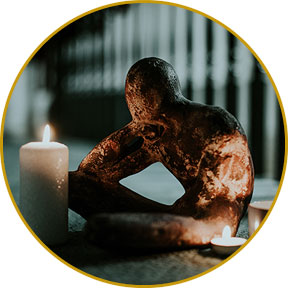It Death Really the Grim Reaper?
Our North American view of death – The Grim Reaper – has many of us pushing death away to long-term care homes, hospitals, and hospices. We also outsource after death care to funeral homes almost exclusively. This is not to say that these services are not required by some of us some of the time but to be honest we North Americans seem to want to banish death from life entirely washing our hands of it so to speak. This attitude has more than 83% of we British Columbians woefully unprepared for the end of our lives.
How have we gotten here?
Well, over the past one hundred and fifty years we have moved from a rural life style to an urban one. Stats Canada and the US Census Bureau provide the details of this huge migration. In 1850 94% of the population lived in a rural setting. Now fully 85% of us live in an urban setting an almost total reversal of how we once lived.
In 1850 only 11% of our elders lived alone meaning 89% lived in some sort of family structure a clear 70% lived with the children and less than 1% of our seniors lived in a care home. In 1940’s 25% of us lived with our family and now in the 21st century only 12% do, though this trend is beginning to rise again.
What does this mean?
Well, very simply we have lost touch with nature and the natural cycle of life and also with ageing. Back in the day we used to farm, fish, hunt, and garden for our very survival. We were keenly connected to the cycle of the seasons; we had to be for our very existence and the well-being of our families. We planted seeds in the spring, nurtured them through the summer and harvested them in the fall. We raised animals from birth until we slaughtered them for food. We paid attention to the seasons; we needed to so we could be successful at fishing and hunting. Our relationship with nature, the cycles of life and death, was an interdependent one.
We also used to live with our entire family, great grandparents right on down to the youngest of us. We saw firsthand our family members getting older and dying. We used to take great care of our loved ones after death, bathing them, dressing them, laying them in the casket, and burying them in a casket the family likely built in a grave site we likely dug.
We were fully involved in both life and death and to our benefit!
What has this change cost us?

Well financially about $10,500.00 per funeral on average! It has cost us much more than that though emotionally, physically, and spiritually however. It has also cost us all the loss of a considerable amount of life wisdom!
Let’s have a look at these five categories of loss and look at what we are truly missing and then what we can to minimize the losses.
Financially
The cost of a funeral in Canada is approximately $10,500.00. If it is the family’s wish and they are financially able to afford this type of expensive sendoff it is not a problem. For many of us though are pockets aren’t so deep and it is a financial squeeze to cover the costs. Much of financial costs can be directly attributed to our fear of death.
We are, as a result of pulling away from death and all it involves, ill-informed and under educated when it comes to making these types of arrangements. We tend then to take at face value the recommendations of professionals in the funeral business and avoid being a well educate consumer. Many families so suffer buyers’ remorse once all is said and done.
Physically
We are human beings after all and by definition very physical. Our physical-ness is very important and often times it is our initial link to our spirit and a kick-starter for our emotions. It a death denying culture such as ours we tend to pull away from the one dying, we tend not to touch, we tend to avoid touching our deceased loved one especially after death. In doing so we often shut down our emotional response to dying and death and we can miss altogether the spiritual aspects of dying and death.
We tend to become numb to it all thereby missing the many hidden benefits being present to dying and death afford.
Emotionally
Generally, we assume that our emotions are a burden both for the family member dying and for our family and friends who are there to support us. Men in our culture are particularly well trained to ‘keep a stiff upper lip.’ Many of us typically suppress our emotions so as not to burden those around us. Because we have backed away from ageing, dying and death over the past several centuries we have also forgotten how to grieve and what healthy grief looks and feels like.
We have become grief rigid.
Spiritually
As we have moved away from the natural cycle of life, from nature Herself, from the Awe of it all – the spiritual wonder of living, we have become spiritually illiterate and inexperienced. We tend to accept facsimiles of spirituality as opposed to knowing, seeing, feeling, and being in touch with our very spirit.
Our fear of death has crippled our personal and intimate knowledge of True Spirit.
Life Wisdom
Back in the day much of our wisdom was learnt or passed down in storytelling, stories often told by our grandparents or great grandparents. These stories were told at the dinner table, by the fireplace, by the bonfire, or while harvesting, fishing or tending to the livestock. Often times the grandparents and the children were together while the parents worked.
With our families now being fiercely independent and the farm chores and firesides much less available so are the story telling opportunities. Too, we send many of our elders off to care homes, senior’s complexes, and long term care homes in a way locking our stories behind closed doors.
So What to Do?
Get curious about death!
Go to a Death Café. Plant a garden. Visit a cemetery. Watch a film such as Me Earl and A Dying Girl. Go to a funeral. Visit a long-term care home. Watch Tuesdays with Morie. Get your own end of life plans in order and create your own All Ready to Go Binder.

Join the Memorial Society of BC and get your funeral arrangements made and on file.
